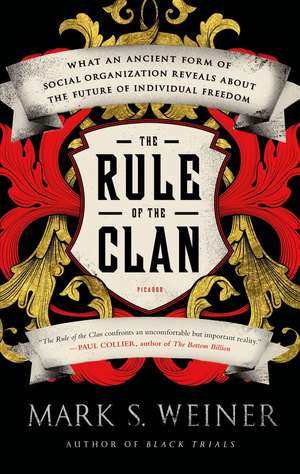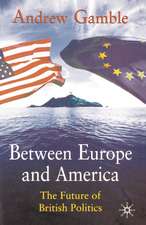The Rule of the Clan: What an Ancient Form of Social Organization Reveals about the Future of Individual Freedom
Autor Mark S. Weineren Limba Engleză Paperback – 3 mar 2014
Winner of the Grawemeyer Award For Ideas Improving World Order
A lively, wide-ranging meditation on human development that offers surprising lessons for the future of modern individualism, "The Rule of the Clan" examines the constitutional principles and cultural institutions of kin-based societies, from medieval Iceland to modern Pakistan.
Mark S. Weiner, an expert in constitutional law and legal history, shows us that true individual freedom depends on the existence of a robust state dedicated to the public interest. In the absence of a healthy state, he explains, humans naturally tend to create legal structures centered not on individuals but rather on extended family groups. The modern liberal state makes individualism possible by keeping this powerful drive in check and we ignore the continuing threat to liberal values and institutions at our peril. At the same time, for modern individualism to survive, liberals must also acknowledge the profound social and psychological benefits the rule of the clan provides and recognize the loss humanity sustains in its transition to modernity.
Masterfully argued and filled with rich historical detail, Weiner's investigation speaks both to modern liberal societies and to developing nations riven by "clannism," including Muslim societies in the wake of the Arab Spring."
Preț: 118.17 lei
Nou
22.61€ • 23.67$ • 18.82£
Carte disponibilă
Livrare economică 10-24 martie
Specificații
ISBN-10: 125004362X
Pagini: 258
Dimensiuni: 141 x 222 x 18 mm
Greutate: 0.3 kg
Editura: Picador USA
Descriere
Winner of the Grawemeyer Award For Ideas Improving World Order
A lively, wide-ranging meditation on human development that offers surprising lessons for the future of modern individualism, "The Rule of the Clan" examines the constitutional principles and cultural institutions of kin-based societies, from medieval Iceland to modern Pakistan.
Mark S. Weiner, an expert in constitutional law and legal history, shows us that true individual freedom depends on the existence of a robust state dedicated to the public interest. In the absence of a healthy state, he explains, humans naturally tend to create legal structures centered not on individuals but rather on extended family groups. The modern liberal state makes individualism possible by keeping this powerful drive in check and we ignore the continuing threat to liberal values and institutions at our peril. At the same time, for modern individualism to survive, liberals must also acknowledge the profound social and psychological benefits the rule of the clan provides and recognize the loss humanity sustains in its transition to modernity.
Masterfully argued and filled with rich historical detail, Weiner's investigation speaks both to modern liberal societies and to developing nations riven by "clannism," including Muslim societies in the wake of the Arab Spring."















